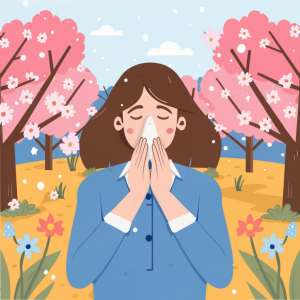Table of Contents
ToggleAllergies themselves do not directly cause a fever. They are the result of the body overreacting to allergens and releasing histamine, which causes allergy symptoms.
However, fevers are a response to infections caused by bacteria or viruses.
Therefore, it is important to differentiate between allergy symptoms and symptoms of infections, such as sinus infections, colds, flu, or COVID-19, to receive proper treatment.

Key Takeaways:
- Allergies do not directly cause a fever; fevers are typically a response to infections.
- Allergies make individuals more susceptible to infections that can lead to fever.
- Distinguishing between allergy symptoms and symptoms of infections is crucial for appropriate treatment.
- Allergy relief options include avoiding allergens, using medication like antihistamines and decongestants, and considering immunotherapy.
- If allergies are accompanied by a fever, seeking medical advice for accurate diagnosis and treatment is essential.
Understanding Allergies and Fever
Allergies are the result of the body’s immune system overreacting to harmless substances, known as allergens.
When exposed to an allergen, the immune system releases chemicals, such as histamine, which triggers allergy symptoms like sneezing, itching, and watery eyes.
On the other hand, fevers are typically a response to infections caused by bacteria or viruses.
When the body detects the presence of these harmful pathogens, it raises its internal temperature to combat them.
This increased body temperature is what we commonly refer to as a fever.
While allergies can make a person more susceptible to viral or bacterial infections, it is important to note that it is the infection that causes the fever, not the allergies.
If a person with allergies experiences a fever, it is likely due to an unrelated infection.
It is essential to differentiate between allergy symptoms and symptoms of infections, such as sinus infections, colds, flu, or COVID-19, to receive proper treatment.
Understanding this distinction can help individuals seek appropriate medical care and effectively manage their allergies.
Allergy relief options include avoiding allergens, using medication like antihistamines and decongestants, and considering immunotherapy under the guidance of a healthcare professional.
| Allergies | Fevers |
|---|---|
| Result of the immune system overreacting to harmless substances (allergens) | Response to infections caused by bacteria or viruses |
| Symptoms include sneezing, itching, and watery eyes | Increased body temperature to combat harmful pathogens |
| Can make a person more susceptible to infections | Typically a symptom of an infection rather than allergies |

The Role of Infections in Fever
Fevers are typically a response to infections caused by bacteria or viruses, rather than a direct result of allergies.
However, allergies can indirectly contribute to the occurrence of fevers by increasing vulnerability to infections.
When allergies are present, the body’s immune system is already in a heightened state of reactivity, which can weaken its ability to fight off pathogens effectively.
Allergy symptoms such as nasal congestion, coughing, and sneezing can create an environment that is favorable for the growth and spread of bacteria or viruses.
For example, the constant drainage of mucus caused by allergies can lead to sinus infections, which commonly present with fever as a symptom.
The inflammation and irritation caused by allergies can weaken the respiratory system, making it more susceptible to respiratory infections such as the common cold or flu.
It is crucial to recognize that when a person with allergies experiences a fever, it is likely due to an unrelated infection rather than a direct result of their allergies.
To determine the underlying cause of the fever, it is important to differentiate allergy symptoms from those of infections.
Seeking medical advice and evaluation is essential for a thorough examination and the appropriate treatment.
| Allergies | Infections |
|---|---|
| Inflammatory response caused by the immune system’s reaction to allergens | Bacterial or viral invasion in the body |
| Release of histamine leading to allergy symptoms | Activation of immune cells to fight off pathogens |
| Allergy symptoms: sneezing, itching, nasal congestion | Infection symptoms: fever, body aches, sore throat |
| Allergies do not directly cause fevers | Fevers are a response to infections |
Differentiating Allergy Symptoms from Infections
Recognizing the difference between allergy symptoms and signs of infections such as fever can aid in accurate diagnosis and prompt treatment.
Allergies themselves do not cause fevers, but rather, fevers are typically a response to infections caused by bacteria or viruses.
When experiencing a fever alongside allergies, it is important to assess the other symptoms present to determine the underlying cause.
Allergies are characterized by symptoms such as sneezing, watery eyes, itching, and nasal congestion.
These symptoms are typically triggered by exposure to allergens such as pollen, pet dander, or dust mites.
On the other hand, infections can cause a wide range of symptoms, including fever, body aches, sore throat, cough, and fatigue.
While both allergies and infections can result in nasal congestion or runny nose, fever is not a common symptom of allergies.
If you are unsure whether your symptoms are due to allergies or an infection, it is advisable to consult a healthcare professional.
They can evaluate your symptoms, conduct necessary tests, and provide appropriate treatment.
A thorough examination will help determine whether your fever is related to an allergic response or an underlying infection that requires further medical intervention.
Allergy Symptoms vs. Infection Symptoms
| Allergy Symptoms | Infection Symptoms |
|---|---|
| Sneezing | Fever |
| Watery eyes | Sore throat |
| Itching | Cough |
| Nasal congestion | Body aches |
| Fatigue |
Managing Allergies and Seeking Relief
Managing allergies effectively involves implementing various strategies to reduce allergen exposure and alleviate allergy symptoms, potentially minimizing the occurrence of fevers.
Avoiding Allergens
One of the most effective ways to manage allergies is to minimize exposure to allergens.
This can be done by identifying specific triggers and taking steps to avoid them.
For example, if pollen is a trigger, staying indoors on high pollen count days and keeping windows closed can help reduce symptoms.
Additionally, using allergen-proof bedding, regularly cleaning and vacuuming the home, and avoiding pets or other known allergens can also be beneficial.
Medication Options
Over-the-counter medications such as antihistamines and decongestants can provide temporary relief from allergy symptoms, including congestion, runny nose, and sneezing.
These medications work by blocking the effects of histamine, reducing inflammation in the body.
It is important to consult with a healthcare professional before starting any new medication to ensure it is safe and appropriate for individual needs.
Immunotherapy
This involves exposing the body to small amounts of allergens over time, allowing it to build up a tolerance.
Immunotherapy can be administered through allergy shots or sublingual tablets.
It is a long-term treatment that requires regular visits to a healthcare professional, but it can be highly effective in reducing allergy symptoms and potentially minimizing fevers caused by allergies.
| Allergy Management Strategies | Benefits |
|---|---|
| Avoiding allergens | Reduces exposure and minimizes symptoms |
| Using medication | Provides temporary relief from allergy symptoms |
| Considering immunotherapy | Builds up tolerance and reduces allergy symptoms |
It is important to remember that while managing allergies can help alleviate symptoms, it is essential to seek medical advice if a fever occurs alongside allergies.
Importance of Proper Diagnosis and Treatment
When allergies coincide with a fever, it is crucial to obtain a proper diagnosis to differentiate between allergy-related symptoms and potential infections.
Allergies themselves do not cause fevers; however, they can make individuals more vulnerable to viral or bacterial infections that may lead to fevers.
Therefore, it is essential to seek medical attention and receive an accurate diagnosis to determine the underlying cause of the fever.
Proper diagnosis plays a vital role in distinguishing between allergy symptoms and those caused by infections such as sinusitis, colds, flu, or even COVID-19.
With an accurate diagnosis, healthcare providers can guide patients toward effective management strategies.
These may include avoiding allergens known to trigger allergic reactions, utilizing medications such as antihistamines and decongestants to alleviate symptoms, or considering immunotherapy for long-term relief.

Seeking Medical Advice and Evaluation
If you experience a fever in conjunction with your allergies, it is recommended to consult a healthcare professional to evaluate the situation and provide proper medical guidance.
When seeking medical advice, a healthcare professional will conduct a thorough examination to determine the underlying cause of your fever.
They will assess whether the fever is related to your allergies or if it is a result of an unrelated infection.
This evaluation is crucial for obtaining an accurate diagnosis and ensuring that you receive the most effective treatment for your specific condition.
During the evaluation, the healthcare professional may ask about your allergy history and symptoms, as well as any other signs of infection you may be experiencing.
They may also perform tests, such as blood work or allergy testing, to further investigate and confirm the cause of your symptoms.
Based on the findings, they will develop an appropriate treatment plan to alleviate both your allergies and any associated fever.

A Word from HealthyVibe
Remember, it’s the infection, not the allergy itself, that triggers a fever.
By actively differentiating between allergy symptoms and signs of infection, and adopting effective management strategies, you can adeptly handle this complex relationship.
Allergies, caused by an overactive immune response to allergens, lead to histamine release and typical allergy symptoms.
Embrace allergy relief methods like avoiding allergens, using antihistamines, and decongestants, and considering immunotherapy.
These proactive steps can not only reduce allergy symptoms but also lower your susceptibility to fever-causing infections.
Can allergies cause a fever?
No, allergies themselves do not cause a fever. Allergies are the result of the body overreacting to allergens and releasing histamine, which causes allergy symptoms. Fevers, on the other hand, are a response to infections caused by bacteria or viruses.
What is the relationship between allergies and fever?
Allergies do not directly cause fevers. While allergies can make a person more susceptible to viral or bacterial infections, it is the infection that causes the fever, not the allergies.
How can I differentiate between allergy symptoms and symptoms of infections?
Allergy symptoms typically include sneezing, itching, and watery eyes, while symptoms of infections may include fever, sore throat, body aches, and fatigue. It is important to pay attention to the specific symptoms experienced in order to seek appropriate treatment.
How can I manage allergies and find relief?
Strategies for managing allergies and finding relief include avoiding allergens, using medication like antihistamines and decongestants, and considering immunotherapy. These approaches can help reduce allergy symptoms and potentially alleviate any associated fevers.
Why is it important to obtain an accurate diagnosis when experiencing a fever alongside allergies?
Proper diagnosis is essential to differentiate between allergy-induced symptoms and those caused by infections. This ensures that individuals receive appropriate treatment for their specific condition and can effectively manage their health.
When should I seek medical advice and evaluation for allergies and fever?
If allergies are accompanied by a fever, it is recommended to consult healthcare professionals for a thorough examination. They will be able to determine the underlying cause of the fever and provide appropriate treatment.









